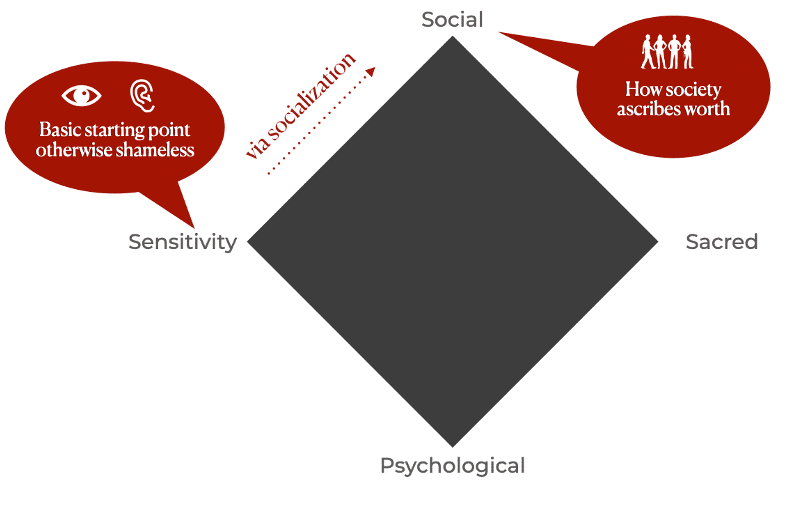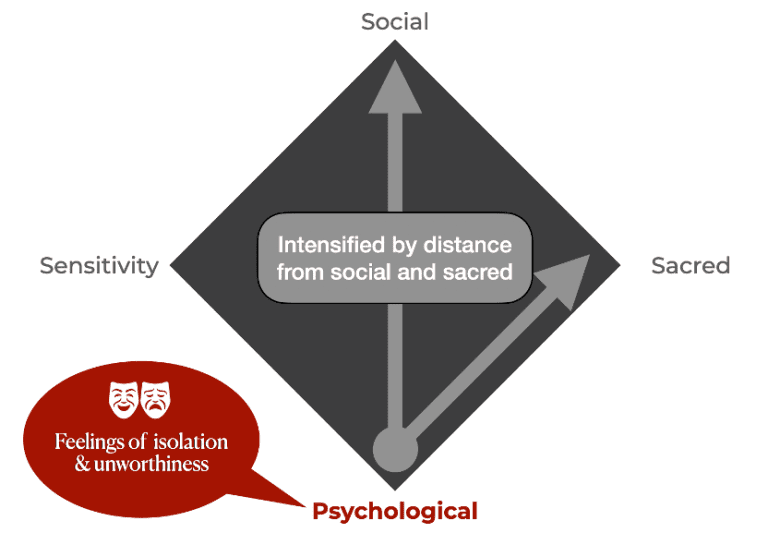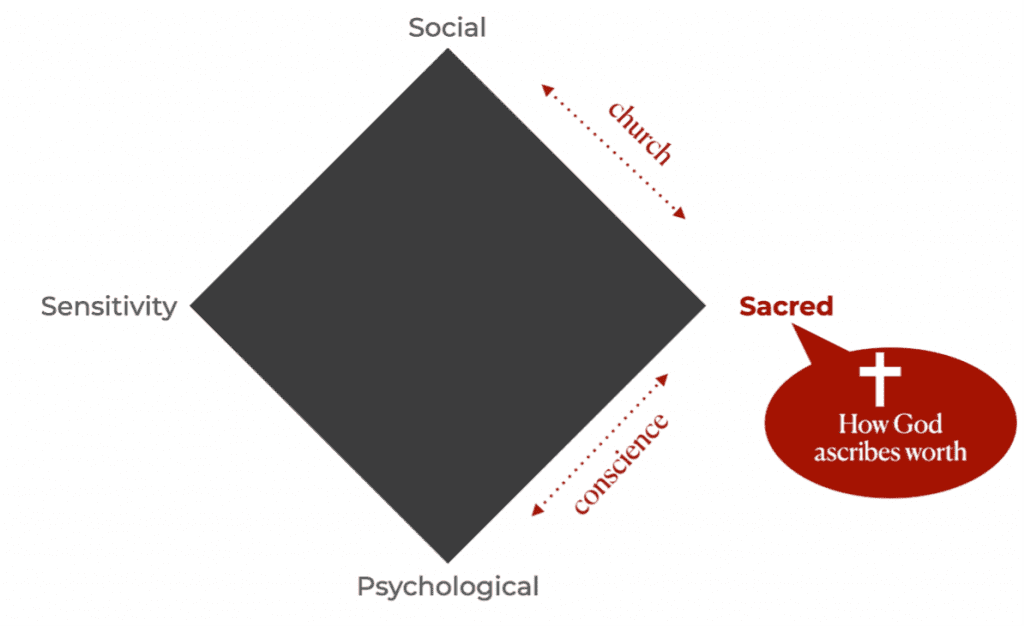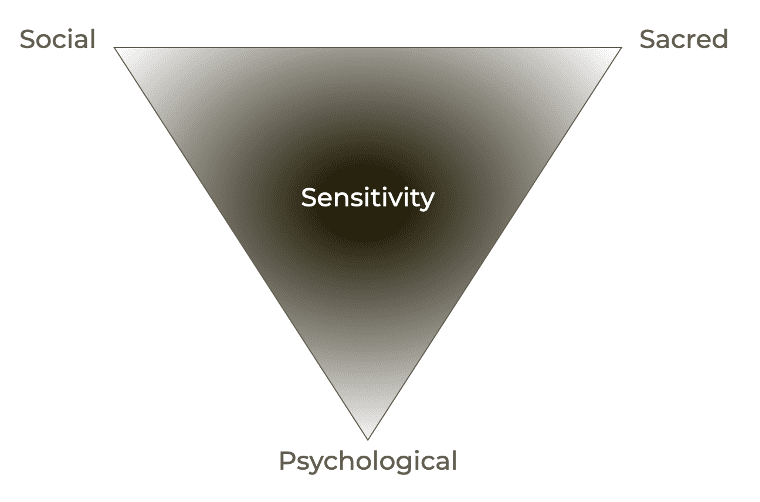- Joined
- Oct 28, 2013
- Messages
- 5,307
- Points
- 113
What’s the relationship between 4 types of shame?
Previously, we saw how Gregg Ten Elshoff in For Shame highlights shame as “sensitivity to social opinion.” This aspect of shame is foundational for every other kind of shame. Without sensitivity to social opinion, a person becomes shameless and immoral.
In this post, I explain the interrelationship between 4 types of shame––shame as sensitivity, social, psychological, and sacred.
Shame as sensitivity
Humans are wired for social connection. We are sensitive to the opinions of others, even if we disagree with those opinions. One is aware and displeased when rejected, isolated, or scorned.Without this sensitivity, we have no capacity to become moral agents. Shamelessness is the path to immoral living. Accordingly, such sensitivity is the basic starting point for experiencing other types of shame.
Social Shame
Social shame is based on the measure that society uses to ascribe worth. It is the dishonor suffered by a person (or people) at the hand of some social group. Bullying, doxing, being “canceled,” and insults are ways that a community shames or dishonors others.
It’s important to note, however, that the individual experiencing social shame does not necessarily suffer psychological shame (explained below). Thus, when the Pharisees called in the apostles in Acts 5:40-41,
“they had them flogged. Then they ordered them not to speak in the name of Jesus, and let them go. As they left the council, they rejoiced that they were considered worthy to suffer dishonor for the sake of the name.”
Because the Pharisees behaved as outsiders to God’s kingdom, the apostles did not feel the psychological pain or distress that would come if they identified themselves more closely with the Pharisees.
Through socialization, a person learns what society deems shameful and honorable. No one is born with this knowledge. Regard for one’s community fosters great sensitivity to their opinion. The more a person internalizes the norms of the ingroup, the more likely they will experience psychological shame when they veer from them.
Psychological Shame
If someone says the word “shame,” your first thought will probably concern psychological shame. This is an internal experience; it is an intense feeling of unworthiness.Although felt inward, the force of this shame stems from its social underbelly. How so? Someone experiencing psychological shame does so because they perceive a watching public, whether real or imagined, whether a crowd, God, or just themselves. Even seeing ourselves fall short of our own ideals can evoke some degree of shame.

Sacred Shame
Sacred shame derives from what God deems worthy of shame or honor. As I state elsewhere,Like social shame, this is an objective shame. That is, a person or thing is determined to be shameful according to some outside measure; in this case, God’s character. Ultimately, God is the measure of true honor/glory (and conversely, whatever is dishonorable or shameful). Having shame before God may or may not be linked directly with psychological or social shame.
For example, Daniel 12:2, “And many of those who sleep in the dust of the earth shall awake, some to everlasting life, and some to shame and everlasting contempt.” Paul adds that the “enemies of the cross of Christ … glory in their shame, which minds set on earthly things” (Phil 3:18–19). Finally, Peter writes, “Yet if anyone suffers as a Christian, let him not be ashamed, but let him glorify God in that name” (1 Pet 4:16; cf. Rom 1:16).
Whereas sensitivity is the starting point, having a sense of sacred shame is the goal of Christian character. However, one should not think that we can skip from one to the other. It is impossible both practically and theologically.
How so? Practically, no one has a sense of morality apart from community. Theologically, sacred shame is fostered within the church. This comes through living life with one another, being the body of Christ, as expounded throughout the New Testament.

On the one hand, high levels of psychological shame can prevent people from repenting (i.e., an expression of sacred shame). On the other hand, low levels of psychological shame can catalyze genuine life change. Furthermore, some degree of psychological shame is a fruit of repentance. Consider Ezekiel 16:53–54, where the Lord says,
I will restore their fortunes, both the fortunes of Sodom and her daughters, and the fortunes of Samaria and her daughters, and I will restore your own fortunes in their midst, that you may bear your disgrace and be ashamed of all that you have done, becoming a consolation to them.
In these respects, the conscience uses psychological shame to shape our behavior and develop character. (On this point, Te-Li Lau further distinguishes “retrospective shame” and “prospective shame” when discussing how Paul discipled his churches.
Different Illustration. Same Explanation.
The picture above could be redrawn, as seen below. Each diagram has its own advantages. The following illustration places “sensitivity” in the middle, indicating its integral role in connecting other types of shame. Furthermore, it shows the natural progression from social to sacred and places the psychological in a distant position from the above shame types.
Are these diagrams and this explanation helpful? What else needs to go into my explanation?


